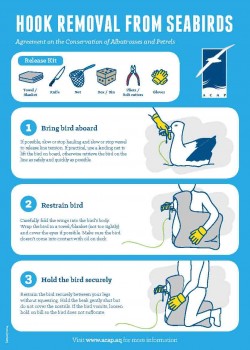Erika Zollett (MRAG Americas, St. Petersburg, Florida, USA) and Yonsat Swimmer have published open access in the journal Endangered Species Research on practices to increase post-capture survival of seabirds and other marine life.
“Many of these fact sheets and practical information on seabird mitigation measures are contained in the Agreement on the Conservation of Albatrosses and Petrels (ACAP) bycatch mitigation fact sheets”.
The paper’s abstract follows:
“Incidental capture of marine animals in fishing gear may cause immediate or delayed mortality due to injury. Increasing post-capture survival of these species is very important to reducing the widespread impacts of bycatch, particularly on protected and threatened populations. In this paper, we review recent literature on safe handling of sea turtles, cetaceans, seabirds, sharks, and billfish and summarize the most effective measures for improving survivability of these species after interactions with gillnet, pelagic longline, and purse seine gear. We also review the current tuna Regional Fishery Management Organization (tRFMO) measures on safe handling and release to identify gaps in implementation of safe handling practices. Strategies that increase post-capture survival of marine species can be grouped into 3 primary categories: reducing immediate mortality, minimizing injury that results in delayed mortality, and reducing stress that can lead to death. Routine training of fishermen on safe handling practices greatly improves the effectiveness of these measures. When bycatch does occur, the strategies to increase post-release survival become key for protecting vulnerable marine populations. This inventory highlights the great conservation value that can be provided by the tRFMOs by providing guidance and training on safe handling practices to increase post-release survival across taxa.”

Click here to access ACAP's hook removal guides
Reference:
Zollett, E.A. & Swimmer, Y. 2019. Safe handling practices to increase post-capture survival of cetaceans, sea turtles, seabirds, sharks, and billfish in tuna fisheries. Endangered Species Research 38: 115-125.
John Cooper, ACAP Information Officer, 04 April 2019

 English
English  Français
Français  Español
Español